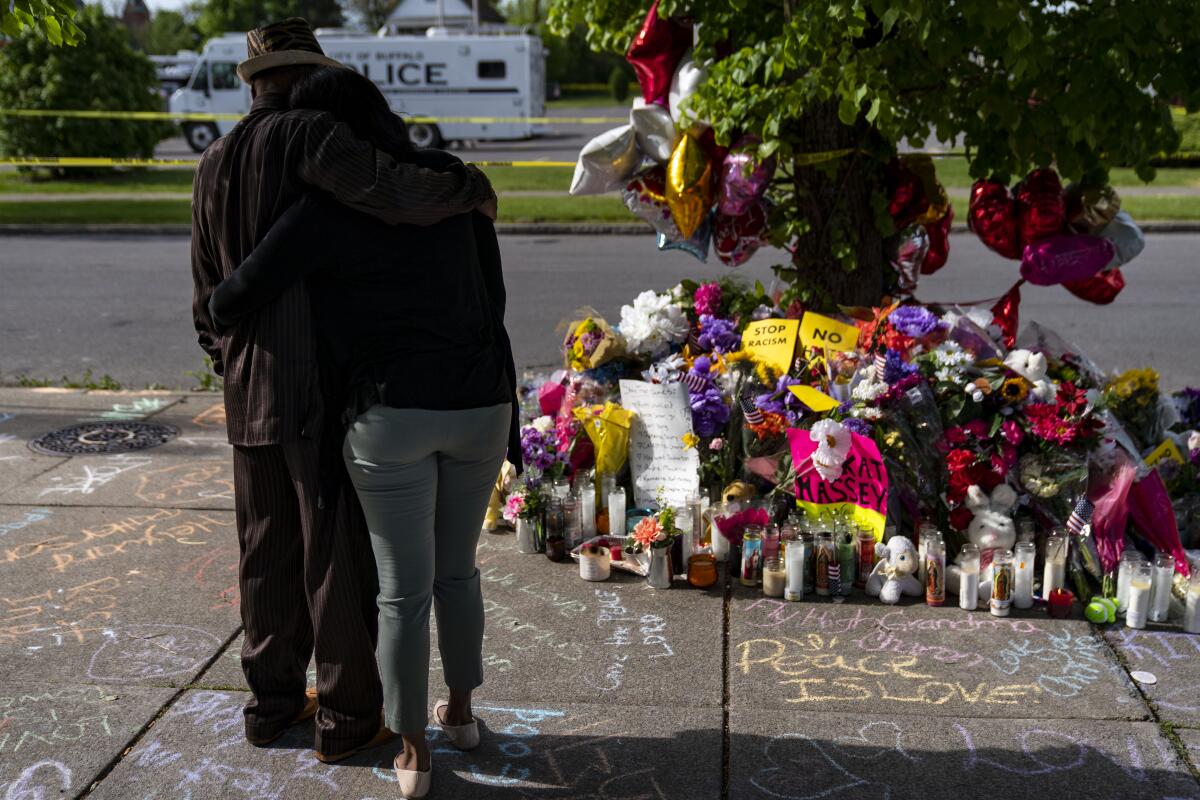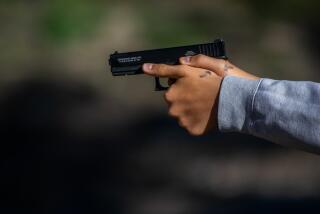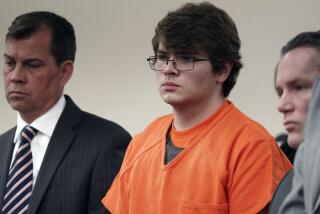Amid anger and grief, some Black residents of Buffalo are talking about guns

BUFFALO, N.Y. — The gunman who killed 10 people at a supermarket in a predominantly Black neighborhood on the East Side of Buffalo on Saturday took more than lives, residents say.
“He took a lot away from this community other than the lives of these people,” said Robin Truesdale, 57, who owns a small business near Tops Friendly Markets, where authorities said Payton Gendron, a white 18-year-old who lived 200 miles away in Conklin, N.Y., targeted Black shoppers in a racist rampage. “He took away also a much-needed resource ... a part of the economic development for this community.”
Tops, which has closed indefinitely, is the only supermarket in the area. Though several groups have donated food and other goods to grieving families, people who were once able to walk to pick up groceries now have to rely on public transportation or other means — indefinitely — at a time when inflation is already at a 40-year high.
Residents describe the East Side as a segregated but tightknit neighborhood where everybody knows one another. Having their neighbors slaughtered during a routine trip to the grocery store in the heart of their community has many of them feeling unsafe, sad and angry. Feeling unprotected in their own neighborhood by government leaders and law enforcement, conversations about guns are quietly occurring among family, friends and neighbors.
While the national dialogue following a mass shooting often turns to gun restrictions and what the president or Congress can do, the conversations happening here are about being able to protect oneself.
“You’ve got poor Black people who are just trying to make a living,” said Cambridge Boyd, CEO of a local nonprofit. “We’re trying to survive here, and ain’t too much to survive off of. ... We’re getting to the point now where the cops are killing us, the racists are killing us, the government — they ain’t paying us no attention — so what else y’all want us to do?”
Adding to the despair is the toxicity of social media, on which Black residents said they’ve seen some white people making a mockery of the massacre with quips about a “cleanup” on several store aisles. According to the Washington Post, the New York Department of Corrections and Community Supervision said it has suspended without pay corrections officer Gregory Foster II, who shared the post on Facebook. The department also said it would “identify and discipline any staff who may have engaged” with Foster’s post following an internal investigation.
“You don’t joke about Black lives being lost in such a violent fashion,” said Derek Middlebrooks, 34, who was born and raised here. “You don’t joke about this. Because at the end of the day, 10 people died. Ten people got to get buried.”
Though Middlebrooks said he’s not personally big on guns, he pointed to the hateful social media posts as justification for Black people on the East Side to arm themselves. A veteran who spent nine years in the Army Reserve, he also advised Black people to educate themselves about gun ownership and firearm use.
“We’ve been getting mowed down for years, shot down, hung and just straight-up slaughtered,” Middlebrooks said, “and it’s been happening more frequently over the years because they continue to get away with it, which is another reason why we need to arm ourselves.”
“Arm ourselves with a gun and I can love you, but if you try to come at me, I’m-a shoot you dead, and that’s just how it’s got to be,” said Middlebrooks, whose mother, Cariol Horne, a former Buffalo police officer, lost her job and her pension in 2006 for trying to stop a fellow officer from putting a suspect in a chokehold.
“It shouldn’t have to be like this,” he added, “but it’s got to be like this for the simple fact that you’ve got sick people out here that’s willing to come to a grocery store from three hours away and kill our people, and it’s pissing me off. ... You’ve got racist people out here that are rejoicing because 10 Black lives were lost.”
Jarrold Anderson, a 33-year-old independent appraiser who left Tops roughly an hour before shots were fired Saturday, said people in his community don’t want something like this to ever happen again. He lamented that young people in the neighborhood are forced to grow up thinking, “I can’t go to the grocery store and be safe because I’m Black.”
“If anybody does try to do that again in our community, they will be met with resistance,” Anderson warned. “We’re not all just fish in a barrel here. We are capable of defending ourselves.”
A July 2020 survey conducted by National Shooting Sports Foundation found a 95% increase in firearm sales during the first half of that year. Retailers reported that the largest demographic increase was among African Americans, whose purchase of firearms had increased by 58% compared with the first half of 2019.
In the state of New York, costs for firearms licenses vary by county, and the process for obtaining a state license takes at least four months once an application is submitted. The list of eligibility requirements includes being “of good moral character,” having “no prior felony or serious offense convictions” and having “a legally recognized reason for wanting to possess or carry a firearm.”
While the conversations about gun ownership appear to be widespread on the East Side, it’s by no means a universal opinion that more guns are the solution to feeling unsafe.
“Some people are all kumbaya right now, and some people are like, ‘Nah, [forget] that,” said Rhys Hall, who lives in a different part of Buffalo but whose father grew up in the neighborhood.
Ameer Mcbeth, a 27-year-old part-time worker at Highmark Stadium, home of the NFL’s Buffalo Bills, and the KeyBank Center, where the NHL’s Buffalo Sabres plays, suggested a better solution would be a larger police presence or a neighborhood watch program.
“The security guard who was out there who sacrificed his life because he was protecting people from that guy with the gun, we need more people that can do stuff like that,” he said. “If we do, that will help save lives.”
Chiwuike Owunwanne, who works in the financial services industry, said that while he’s heard conversations about having more guns, he’s unsure that’s the best solution.
“Simply by everyone purchasing a gun does not make everyone safe, because if that was a fact, then the security officer would be alive today, wouldn’t he?” he said. “Because he had a gun. So the mere notion that by everyone having guns is going to make people safer, I think that’s just a fallacy.”
Some residents said that younger people in the neighborhood wanted to somehow retaliate for Saturday’s attack on their community but that they’ve held off because families of the victims want peace.
Wayne Jones Jr., 27, lost his grandmother, 65-year-old Celestine Chaney, in Saturday’s shooting. He encouraged people to get their gun permits if they feel like that’s what they need to do to protect themselves. But he is more concerned about getting assault rifles off the streets.
“I’m trying to be peaceful,” Jones said. “I want to be peaceful for my grandmother. That’s exactly how she was.”
Asked about the warnings reporters have heard from residents about the prospect of a race war if Black people on the East Side let their anger get the best of them, Boyd, the nonprofit leader, said it was a real possibility, particularly if hate continues to spread across social media.
“They keep making these threats on Facebook; there are African Americans in this community that’s armed and ready, my brother, and they ain’t in the military,” said Boyd, who served in the Navy. “A lot of them don’t have too much to live for. It’s us against them, and that’s how they feel.
“If it goes down,” he added, “God help us. This city? Oh, this city will burn.”
Times staff writer Connor Sheets contributed reporting.
More to Read
Sign up for Essential California
The most important California stories and recommendations in your inbox every morning.
You may occasionally receive promotional content from the Los Angeles Times.











